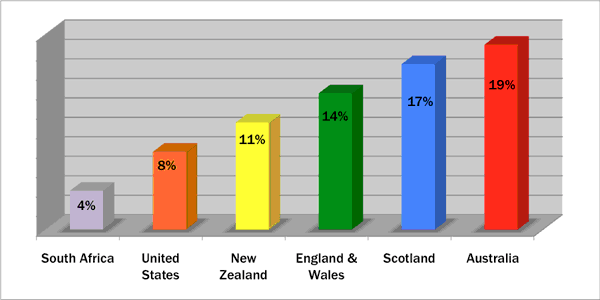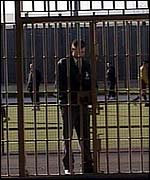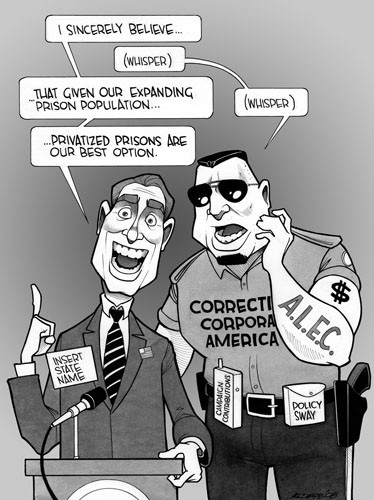The problem with private prisons is that the profit-motive is not compatible with humane and fair justice systems. The "rights and needs of prisoners" are subordinated to the desire for cost-cutting and profits, whilst governments divest themselves of responsibility for protecting those rights. Cost-cutting can lead to inadequate health-care, hygiene, security and discipline in prisons.
Justice Dowd told an Australian inquiry:
Our primary concern is that human rights bind governments either legally or morally. Human rights do not bind a private contractor and cannot bind a private contractor because these are non-delegable rights.. You cannot impose human rights on a contractee running a prison system or otherwise.
Percent of Prisoners Held Privately (2011/12)

For private prison operators business depends on maximising the number of detainees, whilst minimising the costs of housing and guarding them. Prisoners are treated as commodities rather than with dignity. There is little incentive to rehabilitate prisoners who will otherwise keep returning to the prison system. What is more, drug treatment, education and job training are costs that can eat into profits.
 The UK was the first European nation to transfer the management of a public prison to a private company in 1992. After that it contracted out the design, building and operation of prisons to the private sector.
The UK was the first European nation to transfer the management of a public prison to a private company in 1992. After that it contracted out the design, building and operation of prisons to the private sector.
By 2012, there were 14 private prisons in England and Wales, holding over 13 percent of the total prison population. All were run by thee multinational security companies: G4S, Serco and Sodexo.
Yet two out of the three worst perfoming prisons in the UK, according ot the Ministry of Justice, are privately run: Oakwood prison by G4S and Thameside prison by Serco.
In 2003 hundreds of inmates were "removed from Britain's first privately-run young offenders institution [Ashfield Young Offenders Institution] after it was condemned as the worst prison in the country." An independent report found that low pay and poor training" of prison guards led to an unacceptably high level of reported assaults on inmates and poor discipline'.
At Kilmarnock prison in Scotland in 2003 staff in the prison's detox and drug abuse "could not cope with the volume of cases. The problem was so serious that 'the mentally ill are being neglected as are the genuinely ill'... Staff were at 'breaking point' because of poor pay and stress caused by working as many as seventy hours most weeks."
In 2013, the new Thameside prison in England was criticized by the chief inspector of prisons for having high rates of assault as well as Serco's response to the assaults. In 2012, it was announced that G4S would lose its contract for England's first private prison, HMP Wolds, after the facility's inmates were found to have high levels of drug use and idleness. Scotland's privately-operated Addiewell Prison was found to be the most violent prison in the country for both staff and inmates in 2011. In 2009, government documents revealed that private prisons in England and Wales were less proficient than their publicly-operated counterparts, and that twice as many inmate complaints were upheld in private facilities than in their publicly operated counterparts.
In the US there are 107 private prisons housing 5% of the prison population.
Since the 1980s the prison population in the US has increased dramatically by almost 8 times as a result of new 'tough on crime' laws that such as mandatory sentencing laws that prevent judges from being lenient in certain cases, truth in sentencing laws that reduce parole periods and three strike laws that require long sentences for repeat offenders. Consequently, the US has the world's highest rate of incarceration per capita; "the United States has only 5% of the world's population but a full 25% of its prisoners". Each year it spends $50 billion on detaining people.
The increase in incarceration has been accompanied by an increase in private prisons (see graph below). "Claiming they can lock people up cheaper than government can, the companies build cells on speculation, then peddle the beds to whatever local or state government needs a quick fix for its growing criminal population."
The companies running these prisons are well aware that their ongoing business depends on these tough sentencing laws. According to the largest of these companies in the US, Corrections Corporation of America (CCA):
The demand for our facilities and services could be adversely affected by the relaxation of enforcement efforts, leniency in conviction or parole standards and sentencing practices or through the decriminalization of certain activities that are currently proscribed by our criminal laws.
 There is also an incentive to corrupt judges to ensure higher sentencing rates. In 2009 "two Pennsylvanian judges pleaded guilty to accepting more than $US2.6M from a private juvenile detention centre, in return for giving hundreds of youths and teenagers longer sentences".
There is also an incentive to corrupt judges to ensure higher sentencing rates. In 2009 "two Pennsylvanian judges pleaded guilty to accepting more than $US2.6M from a private juvenile detention centre, in return for giving hundreds of youths and teenagers longer sentences".
CCA has been a major supporter of the American Legislative Exchange Council (ALEC) which promotes 'tough on crime' laws and "for the past two decades, a CCA executive has been a member of the council's [task force that] produced more than 85 model bills and resolutions that required tougher criminal sentencing, expanded immigration enforcement and promoted prison privatization".
In 2003, Judith A. Greene found a pattern of overcrowding, understaffing, sub-standard healthcare, insufficient programs, and human rights abuses in US prisons which was worse in private prisons.
Both Wackenhut and CCA, the industry "giants," have been cited repeatedly for chronic understaffing, deficient work assignments and education programs that result in widespread prisoner idleness, lack of compliance with proper procedures for inmate classification and discipline, sub-standard medical treatment and inadequate mental health care...
Rates of prison violence are much higher in the private prisons. The BJA national survey findings indicated that there were 65 percent more inmate-on-inmate assaults and 49 percent more inmate-on-staff assaults in private prisons than in comparable public prisons.
In one prison in Hawaii, a prison gang had taken over control of the prison and was running it: "Gang members were said to be attacking other prisoners and staff, dealing drugs, and having sex with the women housed there by the INS. Some staff were said to be "working" for the prison gang. One guard admitted providing drugs for prisoners in exchange for protection."
In mid-2013 CCA lost four prison contracts in three states, two in Texas, one in Idaho and one in Mississippi, "after extensive reports of abuse, neglect, and even fraud within their operations". In Mississippi there were "multiple deadly riots over poor food and sanitation, lack of medical care, and mistreatment by guards. In Idaho the prison was referred to as the "Gladiator School" and CCA was accused of using prison gangs to control the understaffed prison aswell as falsifying staff records to get more state money.
"Australia has the highest proportion of inmates in private prisons of any country" at 19 percent. They are housed in eight men's prisons, two in Victoria (housing one third of all prisoners in the state), two in Queensland, two in New South Wales, one in South Australia and one in Western Australia. There are plans to privatise the entire Queensland prisons system.
The Metropolitan Women's Prison, in Victoria, was taken off the private operator in 2000 for poor performance and is currently run by the state government. The Victorian Correctional Services Commissioner had described the prison as "violent, overcrowded and riddled with drugs" and the Public Service Association (PSA) claimed that inadequate staffing had led to frequent lock downs.
Some private prisons seem to have suffered higher numbers of suicides than their public counterparts. There were four suicides at Port Phillip prison in Victoria in its first six months of operation and five suicides in 18 months at the Arthur Gorrie
prison in Brisbane, Queensland, where inmates had to spend up to 20 hours in their cells with inadequate exercise, basic facilities, access to books and high incidents of assaults.
Privatisation of prisons is not popular. The 2009 decision to privatise Parklea prison in NSW was made when less than 20 percent of those surveyed supported prison privatisation.
Before Parklea was privatised, Junee was the only private prison in NSW and the ombudsman received "significantly more complaints" from there than any of the public prisons, some involving serious matters including security and legal representation.
All Australian private prisons are managed by transnational corporations, specifically the US-based GEO group and UK-based G4S and Serco. In some cases ownership of prisons remains in government hands although they are operated for profit by private companies.
In Australia private prisons are generally paid a set amount according to capacity rather than number of actual prisoners.